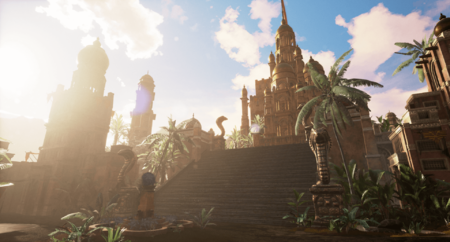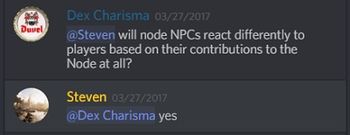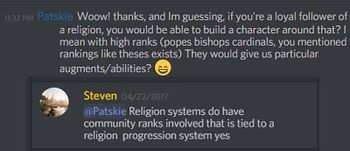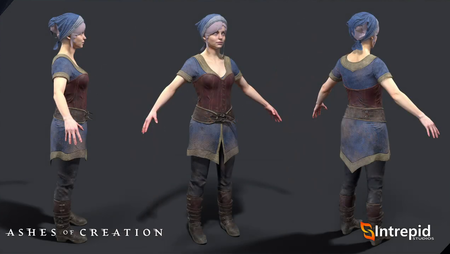Priests
Priests are NPCs that are present at Divine nodes.[1]
- NPCs come and go as required by game mechanics, such as node progression.[4]
- Players will not be able to kill non-combat NPCs such as quest givers and vendors.[5][6]
- We may have some story arcs down the line where you're killing some well-known NPCs, but we got to build it up: we got to make you either love them or hate them before you get to that point.[5] – Margaret Krohn
- During sieges or monster coin events, non-combat NPCs may despawn. If their service buildings are damaged or destroyed by the siege or event they may not respawn until their buildings are repaired or rebuilt.[6][7][8][9]
- During sieges or during monster events those venders, the non-combat NPCs, are usually provided for through a particular building type, unless they're general NPCs. If they're general NPCs currently, I think what we're doing is we're despawning them if they're not combat-oriented and if they are a service building like a constructible, if that building becomes damaged, then the NPC is disabled post the event, or post the siege until the building is repaired; but they're not present to be killed as part of the siege event. If they're a combat NPC, such as a mercenary or like a captain of the guard whatever: they're present, they can be killed and they have ramifications for doing so.[6] – Steven Sharif
- Some NPC movements and behaviors are dictated by time of day or other rotational cycle, others will be static.[10]
- Where we place the NPC rotations that are relevant- those would be rotations that exist perhaps within an hour, not so much within a day so-to-speak. So there might be five minutes of some changing of an organization's acolytes in a temple or something; and that might be because obviously there's a quest related to that rotation.[10] – Steven Sharif
- NPCs will behave differently based on a player's reputation.[11][12][13][14] Otherwise, branching dialog trees are not currently planned for NPC interactions.[11]
- Q: Can you influence NPCs or mobs when interacting with them by using your knowledge of their unique personalities/routines/lore or general knowledge of the world state?
- A: We haven't planned for any type of branching dialogue personalities that give insight to those types of things and I don't believe that's planned for our narrative design, no. There is however some potential faction-based reputations that can be had and those reputations might send the NPCs down different behavior trees; and that is something that is incorporated. But if I understand the question correctly it's more along the lines of catering specific dialogue responses that will send down different dialogue branches and that's not planned.[11] – Steven Sharif
Divine nodes
Divine nodes are focused on faith and skill/equipment augments.[1]
- Priest NPCs are present from the first stage of development (Expedition).[1]
- Favor is a potential currency earned through personal progression at divine nodes.[15]
Divine node governments
Divine node mayors are elected based on the citizen who earns the most PvE favor with the node.[16][17][18][19]
- Most of the devotion-oriented tasks are going to be on an individual basis and won't utilize outside support.[20]
Religion

We're talking about a pantheon here, not necessarily separate religions. They're all offshoots of who is the better god, or who is the god who identifies best with you.[21] – Jeffrey Bard
There are six primary religions as well as a Tulnar/Underrealm religion.[22][23][24]
- Religion is intended to be a motivator, not an aesthetic.[25]
- Choosing a religion enables players to walk a light or a dark path through their choice of questlines and other actions.[26][27][21]
- Players will not be able to worship The Others at temples, but certain quest paths will allow darker forms of worship.[28]
- There will be questlines. There will be certain actions that players are capable of taking to perhaps pursue the darker side of this metaverse so to speak.[26] – Steven Sharif
Sometimes games in the past have tried to shy away from heavy emphasis on religion because of the parallels that can occur between what is in the real world and this fantasy realm. I don't really subscribe to that theory. I think that religion plays a very significant role in the story of what Ashes of Creation is about and it is very much this almost monolithic idea of good vs. evil; so that is really at the crux of what the overarching narrative will be in the game; and I'm not trying to pigeonhole players into "everyone has to be good", like I said earlier there will be opportunities for players to deviate from that, should they so choose to roleplay in that regard.[22] – Steven Sharif
The Tulnar religion is a combination of religious beliefs of the major races as well as pagan beliefs of the minor races over time as they coexisted together in the Underrealm.[30]
- The Tulnar are not a result of corruption.[31]
- The progression of the Tulnar- while they are still the staples of what were once the primary deities of the good pantheon remained for the Tulnar, over the time they existed and evolved into the society that they are at the return to Verra. It's much more similar... to the way the Creole religions advanced, with using components of Christianity as well as Voodoo and other smaller, more "paganesque" religions; and incorporated them into one. To that degree, you can correlate the way that society around the Tulnar has this almost combination of what were pagan beliefs from the minor races as well as the introductions of the major beliefs and religions from the major races, because they all came together in the Underrealm and survived in that regard. So you’re gonna see naturally a combination of those two things.[30] – Steven Sharif
Religious progression
There are player progression paths within a religion.[32][25]
- Players may follow only one religion at a time.[32][25]
- Religious progression is based on quests that are only offered to followers of that religion.[32]
- Religions have a ranking system based on a player's performance in these quests and the number of quests completed.[32][33]
- Changing religion will cause loss of progress in a player's previous religion.[32][25]
- It depends on their dedication to the religion itself; their performance when it comes to certain religion's religious objectives; their contribution to the development of that religion within the world. There's a lot of different markers that we use at each stage to determine how they progress within the religion.[34] – Steven Sharif
See also
References
- ↑ 1.0 1.1 1.2 Blog - Know Your Nodes - The Basics.
- ↑ Livestream, February 28, 2020 (47:45).
- ↑ Livestream, July 31, 2020 (1:54:45).
- ↑ Interview, February 7, 2021 (31:37).
- ↑ 5.0 5.1 Livestream, February 29, 2024 (53:17).
- ↑ 6.0 6.1 6.2 Interview, July 9, 2023 (1:32:45).
- ↑ Livestream, March 31, 2022 (1:13:00).
- ↑ Interview, July 8, 2020 (57:46).
- ↑ Livestream, November 22, 2019 (17:59).
- ↑ 10.0 10.1 Podcast, April 11, 2021 (15:55).
- ↑ 11.0 11.1 11.2 Livestream, July 28, 2023 (1:19:55).
- ↑ Livestream, February 24, 2023 (1:22:04).
- ↑ Livestream, December 23, 2021 (1:26:36).
- ↑

- ↑ Interview, July 9, 2023 (19:56).
- ↑ Blog: Development Update with Village Node.
- ↑ Livestream, August 31, 2023 (24:54).
- ↑ Interview, July 19, 2020 (26:54).
- ↑ 19.0 19.1 Node series part II – the Metropolis.
- ↑ Livestream, March 26, 2021 (1:18:26).
- ↑ 21.0 21.1 Livestream, May 26, 2017 (15:37).
- ↑ 22.0 22.1 Podcast, November 15, 2020 (29:23).
- ↑ Interview, July 19, 2020 (23:15).
- ↑

- ↑ 25.0 25.1 25.2 25.3 Livestream, May 8, 2017 (44:51).
- ↑ 26.0 26.1 Podcast, November 15, 2020 (20:04).
- ↑ Livestream, 2018-04-8 (AM) (16:50).
- ↑ Livestream, July 30, 2021 (1:13:11).
- ↑ Forums - Livestream Q&A 2022-08-26.
- ↑ 30.0 30.1 Podcast, November 15, 2020 (31:13).
- ↑ Livestream, November 22, 2019 (24:33).
- ↑ 32.0 32.1 32.2 32.3 32.4 Livestream, July 25, 2020 (57:02).
- ↑

- ↑ Livestream, June 1, 2017 (33:40).
